May 15, 2025
The graduate’s manifesto: Maisie Meehan Cocker ’25 adapted and directed “An Enemy of the People”
By Michael Hagan ’15, ’19G
“This play is my manifesto,” theatre and political science double major Maisie Meehan Cocker ’25 wrote in the program booklet for “An Enemy of the People,” a play she adapted from the original by Norwegian playwright Henrik Ibsen and directed in the Bowab Studio Theatre at Providence College in two performances in April 2025.
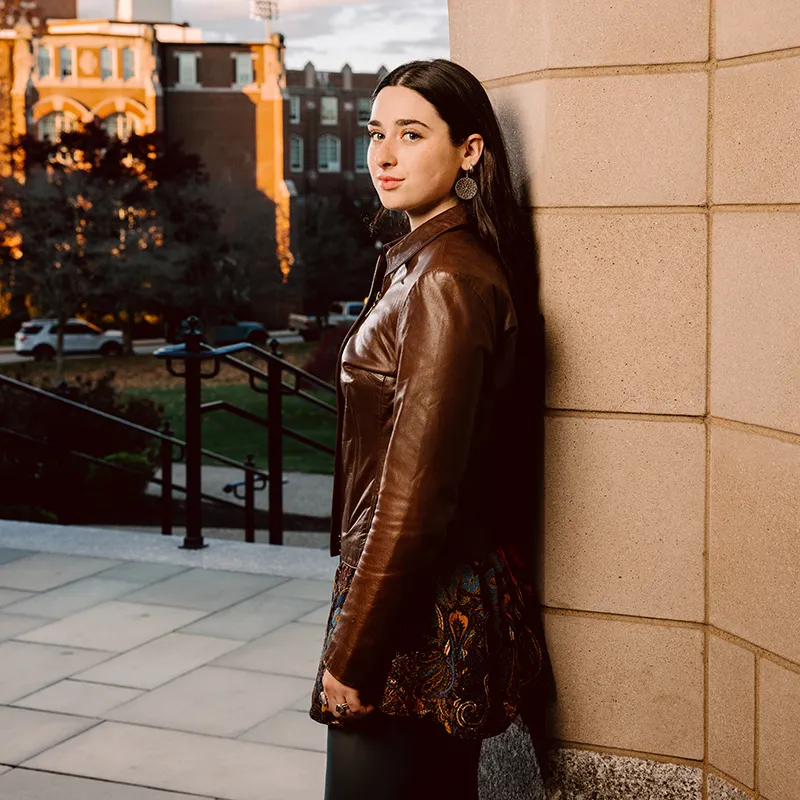
Known by her stage name Maisie Meehan, she encountered “An Enemy of the People” while studying abroad in London in the spring semester of 2024. It was Valentine’s Day, and she had won a lottery for a ticket to the play at the Duke of York’s Theatre. Starring Matt Smith, known for his roles as the Doctor in BBC’s “Dr. Who” and Prince Philip in Netflix’s “The Crown,” it was the second revival of “An Enemy of the People” on London’s West End. Meehan was captivated.
“I was blown away by the language and by the relevance of the themes,” Meehan said. “I had never been more thrilled in a theatre.”
She had been considering how to dovetail her studies in politics with a capstone project in theatre. Ibsen’s play, written in 1882 and rich in commentary on media, communication, truth, spin, nepotism, community, public health, political speech, and duty, seemed a perfect fit.
These were among topics Meehan discussed in courses with Tony Affigne, Ph.D., professor of political science, Rev. Christopher Justin Brophy, O.P., assistant professor of political science, Sara Hassani, Ph.D., assistant professor of political science and of women’s and gender studies, and Jeffery Nicholas, Ph.D., professor of philosophy. They are at the core of questions she has investigated and debated over the course of four years of liberal arts education at Providence College.

“The themes and characters were relevant, but the circumstances were dated. The play is set in a small town where newspapers are the primary media,” Meehan said. “I started wondering, ‘How can I update this for 2025? How can I put it in conversation with current events and the experiences of students?’”
Ibsen’s “An Enemy of the People” is the story of Dr. Thomas Stockmann, a municipal medical officer who discovers a toxic contaminant in his town’s newly opened baths — the celebrated crown jewel of the local economy. When his brother, the mayor, learns that Thomas intends to publish his findings in the local newspaper, he urges Thomas to withdraw the article and resolve the issue more quietly. The newspaper and the mayor conspire to discredit Thomas, who responds by calling a town meeting. At the meeting, Thomas delivers a fiery speech condemning the town’s government, businesses, and people for rejecting the truth of his findings to their own peril. He meets public rage and professional ruin.
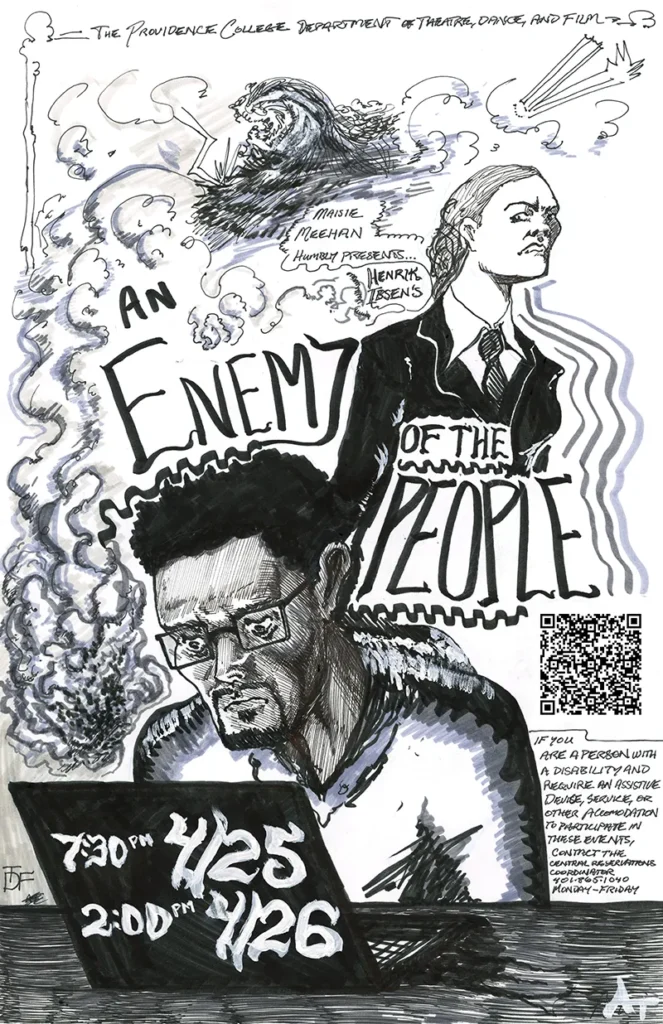
Meehan spent the fall 2024 semester “tearing the original script apart and reimagining it” with Dave Rabinow, M.F.A., adjunct instructor in theatre. In her adaptation, the town baths become the water supply of a fictional New England town, Portcaster, contaminated by waste from a chemical plant owned by Thomas’ mother. Thomas’ sister Paige is the elected town manager. Thomas and his partner, Katherine, are doctoral students at the fictional Portcaster College. The newspaper is The People’s Messenger, a student publication edited by fellow students Hovstad and Billing, with whom Thomas shares an apartment. Thomas, soon to graduate, is the town’s incoming public health administrator.
The most important parts of my play are the relationships between characters.
Maisie Meehan Cocker ’25
“In the play, I’m asking how we’ve become so socially alienated from each other and what the effects of alienation are on our politics and communities. The most important parts of my play are the relationships between characters,” Meehan said.
Rodney Lopez ’25, a political science student like Meehan, starred as Thomas. He brought a vigor and intensity reminiscent of his title role in the college’s production of “Macbeth” his sophomore year.
“Rodney committed to going off-book and committing his lines to memory long before I expected anyone to be,” Meehan said. “He wanted to fully embrace the character, to understand what it is like to believe he has the most important thing to say in the whole community — to feel a duty to proclaim it from a public platform. As an actor, he makes strong choices and does not apologize for them.”
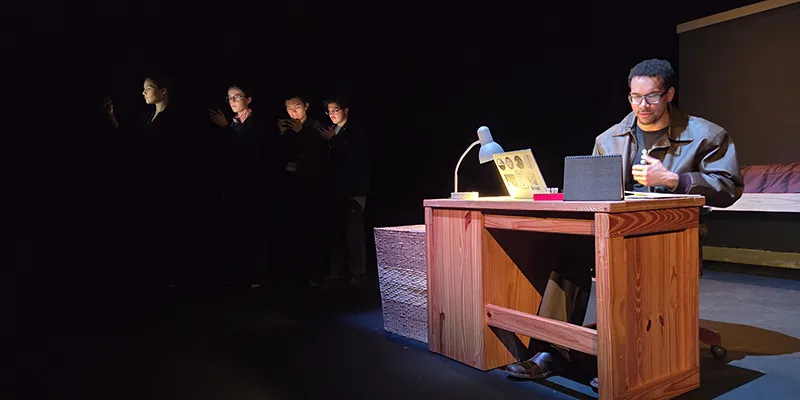
One such choice was Thomas’ climactic speech to the town, delivered in Meehan’s adaptation by a video livestream over social media as the rest of the cast watched on devices in the wings of the stage. In one rehearsal, Lopez picked up a laptop, held it at arm’s length, and started addressing it like a scene partner.
While phones, tablets, television, and other screens play a critical role in Meehan’s plot, as something of a stagecraft purist, she thought about the place of screens on the stage as she developed her adaptation.
“Nowadays, we go to the theatre to get away from the screens. It’s like a rule of theatre: don’t put a screen on the stage,” Meehan said. But seeing Lopez direct Thomas’ frustration and rage toward the laptop’s built-in webcam made her realize this was exactly the performance for which she hoped. The laptop stayed.
Television broadcasts were another important media element in the plot. To depict them, Meehan projected recordings onto her characters and the wall behind them as they watched from a couch facing the audience. The projector also displayed timestamps meant to illustrate how quickly Thomas’ career unraveled once he makes his stand.
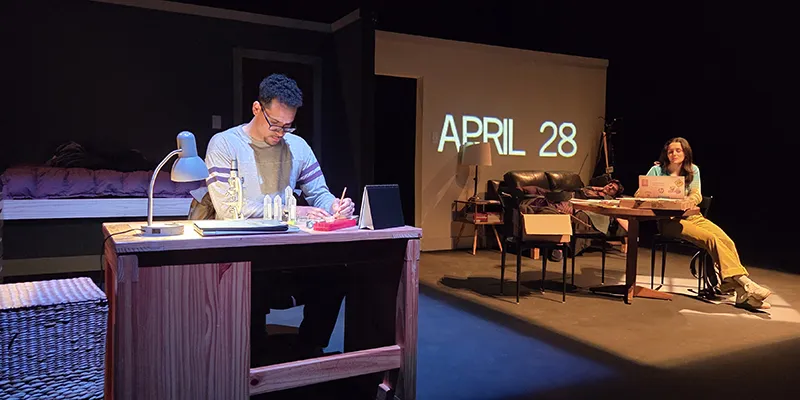
In a technique borrowed from film, Meehan used the timestamp projection along with an acted-out montage to depict Thomas’ intensive research as his friends’ lives go on around him. Katherine, played by Marissa Ward ’27, Hovstad, played by Anthony Maldonado ’27, and Billing, played by Wesley Stephens ’25, lounge, eat, drink, argue, dress in caps and gowns for graduation, and return to the apartment to celebrate at a comically accelerated pace as Thomas works at his bedroom desk in real time.
The montage, which has no dialogue, is set to the frenetic tune of the Talking Heads’ 1980 single “Once in a Lifetime.” By bisecting the stage to create Thomas’ bedroom and the apartment’s separate common space, Meehan depicted two scenes paced differently at one time.
In the student characters, Meehan incorporated traits of her own friends and tendencies she has observed in student researchers, journalists, and activists.
“Hovstad and Billing were representations of two tendencies in me,” Meehan said.

Hovstad, editor-in-chief of The People’s Messenger, is sensitive to the newspaper’s precarious position as an institutionally funded publication. Billing, the youngest character, speaks with naiveite in statements that are variously profound, absurd, or both. Costumed in a T-shirt that says “Support Your Local Dive Bar,” Billing mostly focuses on creating the paper’s crossword puzzles. When he ends up allied with Hovstad, Paige, and others against Thomas, political savvy comes at the expense of his wistful free-spiritedness. Neither what is gained nor what is lost is depicted as an altogether good thing.
And this all happens at Portcaster College. The alliterative and metrical echo of Providence College is no accident. Meehan’s play captures, if at times hyperbolically, the frustrations of being part of any institution or community where the norms and mechanisms that enable people to comfortably devote attention to studies, jobs, art, relationships, and leisure can also beget complacency and groupthink.
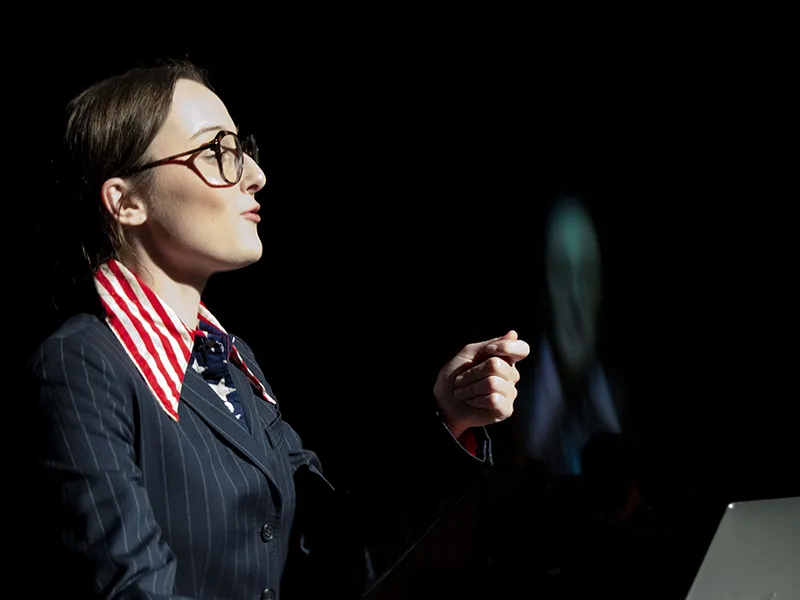
Thomas’ sister, Paige Stockmann, was played by Christina Schwab ’25, a theatre and English double major and Meehan’s friend since their first year at PC. The role was not gender-defined before casting, and Meehan, who is a women’s and gender studies minor, was reluctant to cast the villainous town manager as a woman. But when Schwab auditioned with lines from the mayor of Amity Island in Steven Spielberg’s “Jaws,” Meehan was convinced she was right for the role. When Schwab delivered her scripted address to the town dismissing Thomas’ claims in rehearsal, Meehan stood and applauded the compelling rhetoric and delivery.
“A character like this can’t just be evil for the sake of being evil. It was important that Paige really believe that she’s right,” Meehan said. “But Paige and her mother, Morten, are women contributing to a system that harms other people, other women.”
Among the effects of the contaminant in the water supply Thomas identifies are pregnancy and birth complications and genital cancers.
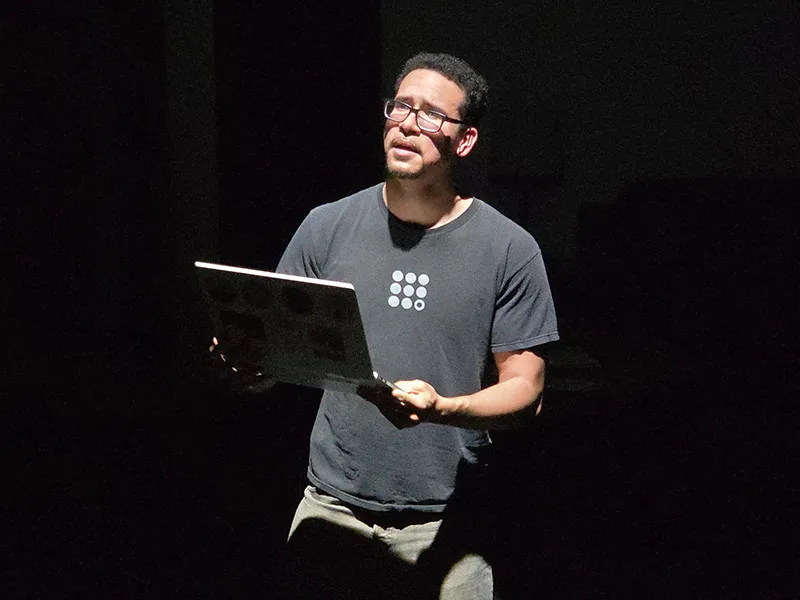
As his speech via live video stream reaches is highest intensity, Thomas says, “Here is my real discovery: The most dangerous enemy of truth in this town — is the public. The majority, if you will. There is a rot in this town that has manifested in complacency … We have allowed the God in our phones to convince us that if an issue isn’t hyper-saturated and entertaining it can’t be relevant … Not thinking feels too good.”
Thinking does not end up feeling good for Thomas, either. By the end of the play, he has lost friends, is reviled by the public, and has caused Katherine to lose her teaching position. As the final scene begins, he wakes up and checks his phone. Social media posts and news headlines condemning him — the many notifications greeting him as he wakes up — are projected on the wall. A new message appears with each heavy beat of “St. Jimmy” from Green Day’s 2004 album, American Idiot, playing in the background.
I know many of you are watching only to contest me. I cannot reach you. However, I know — I hope — there are a handful of people who share my discontent. Who wake up each day feeling that something is deeply, deeply wrong.
Thomas Stockmann, played by Rodney Lopez ’25
Thomas is confronted by his mother, played by Claire Dancause ’26 who says, “I want to see how much of a selfless revolutionary you truly are.” Thomas must recant his claim and declare his findings faulty, or she will take away the student lifestyle and professional future her support enables.
“No job, no degree, no house, no family, no friends. You will be utterly alone … No child of mine will be working against me … I need to know by the end of the day. It’s your choice, Thomas,” she says. And the curtain falls.
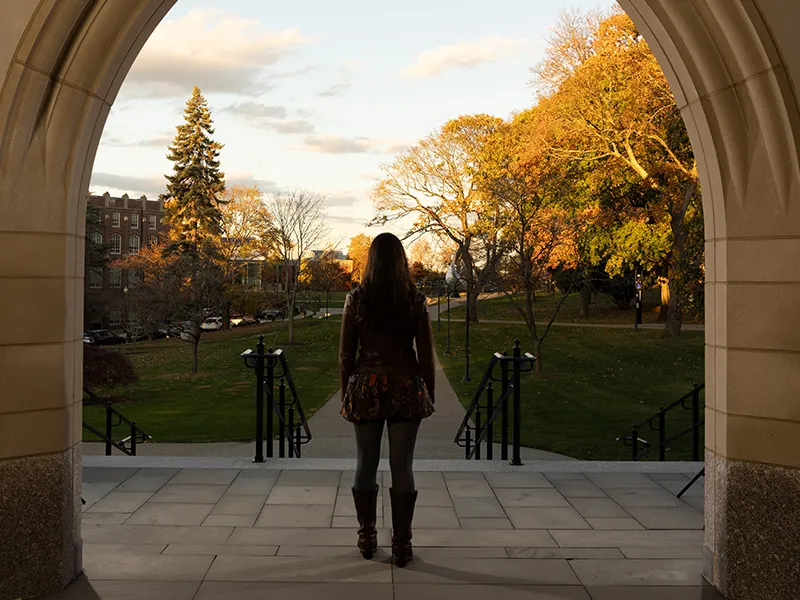
As the curtain falls on her undergraduate career, Meehan is grateful for the intellectual and creative maturation she has experienced in the Department of Theatre, Dance, and Film.
“The arts are a challenging thing to allow yourself to pursue, but these creative collaborations with my peers have given me so much hope for the future,” Meehan said. “I am OK with whatever challenges life after college will bring so long as I can continue to create art like this.”
I’ll go anywhere. I’m excited to work anywhere I continue my craft.
Maisie Meehan Cocker ’25
In June, Meehan will leave her family’s home in Nantucket, Massachusetts, to perform in her second paid summer season at Festival 56, a professional theatre company in Princeton, Illinois. She will act on stage and work in the theatre’s costume shop.
When season ends, “The goal is to audition and cast out as many lines as I can, see what I catch,” she said. “I’ll look for opportunities in Providence, Boston, and New York, but I’ll go anywhere. I’m excited to work anywhere I continue my craft.”





